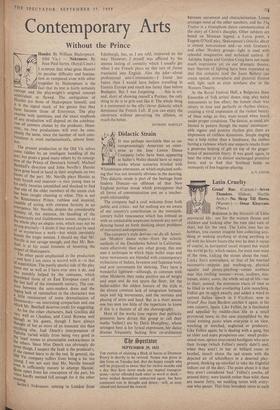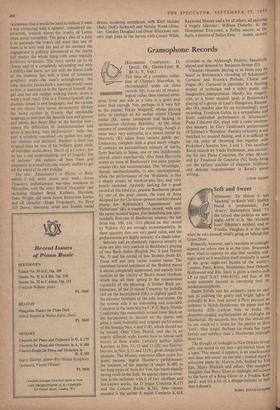Latin Cruelty
Grand' Rue. (Curzon.)—Seven Thunders. (Odeon, Marble Arch.)—No Sleep Till Dawn. (Warner.) — Omar Khayyam. (Plaza.) BOREDOM is the leitmotiv of Latin provincia : not for the women (house and children and looking after the men take care of that), but for the men. The Latin man has no hobbies, you cannot imagine him collecting any- thing or making anything or doing anything at all with his leisure hours (the way he does it varies of course, in horizontal social stripes) but watch the world go by; which means, for most men most of the time, kicking the stones about the road. Lucky Jim's atmosphere, or that of his married successors—nappies and washing-up, physical squalor and penny-pinching—comes nowhere near him (willing womenwives, mothers, mis- tresses, sisters, aunts, the whole set-up of lifc—see to that); instead, the enormous tracts of time to be filled in with that everlasting Latin mooching. Fellini got its spirit exactly and added a word to current Italian speech in I Vitelloni; now in Grand' Rue Juan Bardem catches it again, in his own country, Spain. Like Fellini, he is fascinated and appalled by middle-class life in a small provincial town, -in this case exemplified by the ritual evening paseo when everyone is on view, watching or watched, neglected or predatory. Like Fellini again, he is dealing with a gang, but an older and more prosperous one: small profes- sional men, spruce overcoated hooligans who earn their livings (which Fellini's mostly didn't) and, when they aren't in bar or billiard room or brothel, slouch about the sad streets with the dejected air of schoolboys in a deserted play- ground, thinking up mischief to take the frightful tedium out of the days. The point about it is that they aren't considered 'bad.' Fellini's youths, all around thirty, were loutish rather than wild; these are nearer forty, on nodding terms with every- one who passes. This time boredom turns to such
viciousness that it would be hard to believe it were it not connected with a spinster, considered un- attractiVt, towards whom the cruelty of 'Latins often seems incredible. The gang's idea of a joke is to persuade the town's old maid that one of them is in love with her and at the moment the engagement is publicly announced at the yearly ball shatter the whole thing with some (equally fictitious) revelation. The story works up to its climax and to a completely unyielding end with a fidelity that hurts, not just with the literal truth of the moment but with a kind of luminous prophetic truth—the man's entanglement, the long, desolate future such a marriage would mean to him, is summed up in the figure of himself, the girl and her old mother walking slowly down a wintry mud road. This is a Franco-Spanish pro- duction, filmed in two languages; and the version we are shown here seems permanently off-key for being spoken in French, that unsuitable language to interpret the Spanish face and gesture and idiom. But Betsy Blair as the heroine over- comes the difficulties of internationalism and gives a touching, taut performance : only—her part is unsubtly conceived—its pathos too inept, too obvious and declared. Bardem is here less original than he was in his brilliant glum study of worldlier social decay, Death of a Cyclist: but he has a sad understanding, not of tragedy, but of sadness: the sadness of bare trees and emptiness in a small circular society unable to get off the wheel of its own making.
The rest : Zinnemann's A Haifa! of Rain, which I will write about next week; Seven Thunders, melodramatic war-time nonsense in Marseilles, with the usual British 'character' cast including Stephen Boyd, Kathleen Harrison, Tony Wright, old uncle James Robertson Justice and all (director : Hugo Fregonese); No Sleep Till Dawn, obscurely titled and foolish social
drama involving aeroplanes, with Karl Malden (Baby Doll's husband) and Natalie Wood (direc- tor: Gordon Douglas).and O►nar Khayyam, nur- sery high jinks in the harem with Cornel Wilde,
Raymond Massey and a lot of others, all enjoying it hugely (director : William Dieterle). At the Hampstead Everyman, a Fellini season; at the
Scala, a festival of Indian films. ISABEL (WIG'S

































 Previous page
Previous page